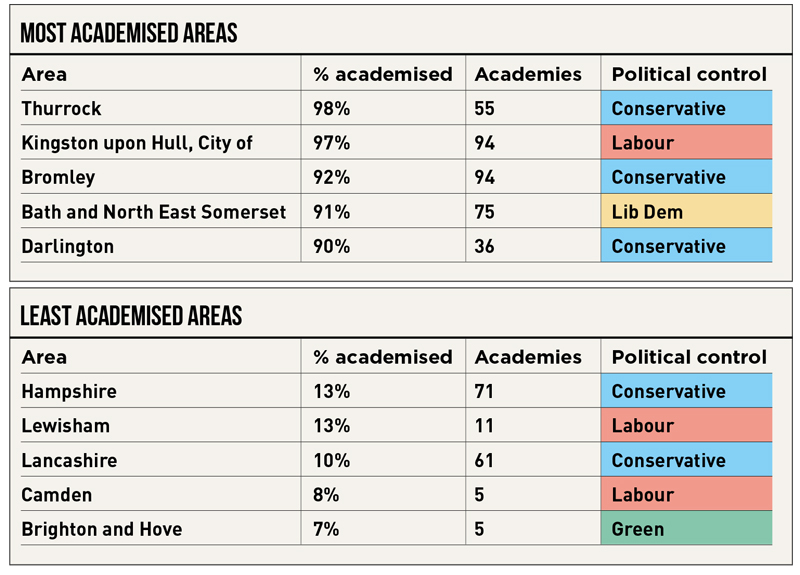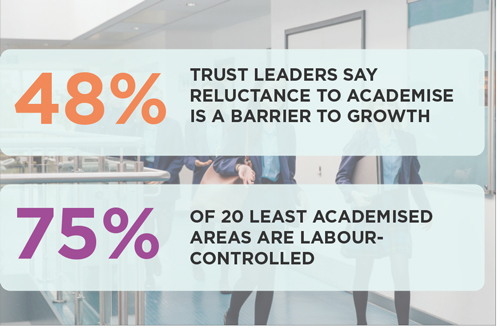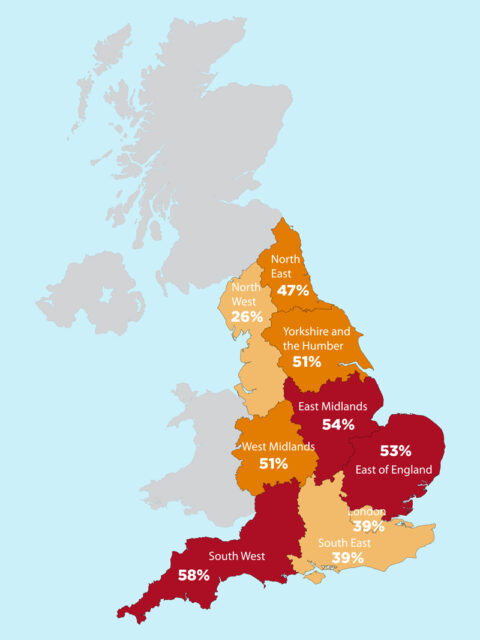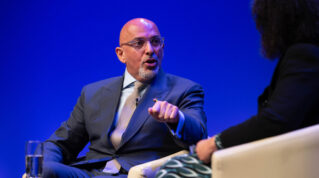Schools in some parts of England are more than 10 times less likely to be academies as in other areas, a Schools Week investigation has found.
With an imminent white paper due to set out the government’s all-academy ambition, Schools Week looks at the areas that have thwarted ministers’ decade-long academisation drive, and what can be done to turn things around.
Academy land hot and cold spots
Analysis of official data by Schools Week reveals that fewer than one in four schools have converted in 25 local authorities.
Holdouts include Brighton and Hove, where just five of its 69 schools are academies – none of which were converted by choice.
By contrast, 45 per cent of schools are academies nationally. In six areas, academisation stands at 90 per cent or higher. Fifty-five of academy capital Thurrock’s 56 schools are academies that chose to convert, or free schools.
Regions show similar divides, with the north-west (26 per cent) less than half as academised as the south-west (58 per cent). The south-east and London rank second and third lowest respectively, both at 39 per cent.
Political faultlines exposed…
Our analysis shows 15 of the 20 least academised areas are Labour-controlled, whereas Conservatives are in power in 11 of the 20 most academised – and held two more until 2019.
Sam Freedman, an ex-government adviser now at Ark Schools, said there had always been a “political element”. Areas like the north-west have shown most “determination to hold onto schools”.
A new survey of trust leaders by The Key found 78 per cent plan expansion this year, but a “reluctance to academise” was the most cited obstacle.

Hannah Clare, children’s committee chair at Green-led Brighton and Hove, said it was “proud to be an outlier against the failing academies policy”. Schools value support and economies of scale received already through the council, she added.
In London borough Lewisham, the fourth-least academised district, Labour cabinet member for schools Chris Barnham added: “We don’t accept the only family of schools is a MAT.”
Schools Week revealed in January that Department for Education (DfE) officials were considering allowing councils to run their own academy trusts, a proposal which could provide a solution for all sides.
In Conservative Thurrock, education cabinet member Barry Johnson said almost all schools had “embraced the opportunity” to academise but kept their “strong” council partnerships.
….but Tory holdouts don’t want change
Yet divergence is “not just a Tory-Labour thing”, Freedman added.
Academisation in Conservative-run Hampshire stands at 13 per cent. Children’s services executive member Roz Chadd highlighted its “effective school improvement team”, with virtually all schools rated ‘good’ or ‘outstanding’.

West Berkshire, another Conservative coldspot, is “neutral” on academisation, according to education executive member Dominic Boeck. “Schools have plenty of autonomy,” he said. “Many have just not seen the advantage.”
Nicola West Jones, head of market research at The Key, said less academised areas often had “vast swathes” of educationally andfinancially strong schools with strong council support. “They’ve got little reason to convert,” she added.
No more ‘low-hanging fruit’
The pandemic has exacerbated the DfE’s headache, with academisation rates hitting a decade-low in 2020. The suspension of Ofsted inspections limited forced conversions.
As for voluntary conversions, Barnham said Covid reminded schools of councils’ “crucial role”.
One trust boss told The Key that schools would also not discuss conversion while “struggling over Covid absences”. Two in five trusts said Covid disrupted growth plans.
But academisation was slowing pre-Covid. Many high-performing and low-performing schools alike had already converted either by choice or compulsion.
“The supply of ‘low-hanging fruit’ is likely to be running low,” said Tom Richmond, another ex-government adviser and founder of think tank EDSK.
In Lewisham, only one school has voluntarily converted in four years, and none have faced forced conversion over the past six years.
Strong trust shortage
Jeff Marshall, of conversion consultants J&G Marshall, said it “can’t simply be there is no appetite” in less academised regions.

He said many schools in his area – the academy col-spot of Lancashire and West Yorkshire -wanted to convert but claim that existing trusts have flaws and that DfE enthusiasm for new trusts is limited.
For Freedman, a strong trust shortage was a bigger issue than politics. Some less-academised areas have fewer strong secondaries which have founded trusts, he said.
“They’ve become reliant on a small number of big MATs, which grew rapidly with less competition. Those have good, centralised turnaround approaches, but that’s not attractive to schools that don’t want that.”
Trusts not all keen to grow
Trust’s own enthusiasm and capacity matter too.
Official data on trusts that have been approved as sponsors details where their “lead” schools are based.
The second least-academised north has the fewest sponsors, while it and Lancashire and West Yorkshire have the fewest sponsors per school.
Freedman said “schools no-one wants” remained a challenge, with rural northern areas like Cumbria home to many tiny, less financially viable schools.

The government has set up the “turnaround” Falcon Education Academies Trust to take on such schools, but it has only two to date.
Trusts may also have “limited appetite for supersize status”, West Jones said. Most of The Key’s respondents said 6 to 10schools was the ideal size. Just 10 trusts have more than 40 schools.
Regulatory hurdles
Regulation exacerbates issues by making the creation of new regional hubs difficult, according to Freedman. Weak trusts can only be forced into stronger ones if all schools are “inadequate” or they are failing financially.
“One school in special measures isn’t attractive, but RSCs can’t easily say ‘here’s a package’ of schools,” he added.
Freedman backs national standards for MATs, making intervention easier – and extra funding for upfront expansion costs.
Central capacity was the second most cited barrier to growth in The Key’s survey.
Charlotte Cornish, director of academy consultants Premier Advisory, said this could be targeted, incentivising trusts in academy hotspots to enter coldspots.
She also recommended letting strong schools continue converting as standalone trusts on condition that they eventually expand.
However ministers have increasingly made it clear they want all academies in a “family of schools” – sounding the death knell for single-academy trusts.
Positive signs for ministers
Even academy hotspots face challenges. In the three most academised regions, academy openings since August 2020 are lower than the national average. Sixty new academies opened in the south-west, a 4.6 per cent rise and the lowest of any region.
Trends are not all bleak for ministers, however.
The academy coldspot of the north saw 133 academies open over the same period – a 22.3 per cent rise. The majority of these belong to trusts in the Diocese of Hexham – which shows the impact of a growing wave of Catholic diocese-led conversions.
For all Covid’s challenges, 42 per cent of trust leaders told The Key it had not affected growth. One called it a “catalyst” that has accelerated interest in collaboration.
It may mean “some pent-up demand” among trusts, with the return of in-person meetings makes trust-school relationship-building easier, West Jones said.
There may be particular growth potential in regions with average academisation rates like the West Midlands. They have higher numbers of both sponsors and trusts, typically with fewer schools.
Council MATs ‘possible way forward’
Lockdown savings may also help bankroll expansion. Around nine in 10 schools reported having cash leftover in their 2019-20 accounts, according to the National Audit Office.
The watchdog even found a “sizeable minority” of trusts were building up “substantial” reserves.

In contrast, Lewisham’s Chris Barnham accused the government of a “creeping undermining of the council’s financial position”, that makes it harder to maintain schools. And highly-academised areas can reach a “tipping point” where councils want out, Freedman said.
A DfE spokesperson said the white paper would detail plans within months to “accelerate” all schools joining MATs to help children fulfil their potential.
West Berkshire cabinet member Boeck said council-run MATs were a “possible way forward”, and his counterpart Chadd said Hampshire wanted to work with schools to see if the model “has merit”.
The stakes are high. Richmond warned: “Unless the white paper can provide maintained schools and local authorities with a compelling logistical and financial case, the much-maligned status quo could drag on for years to come.”








Very good piece Tom. I think it’s highly illustrative that The Falcon Education Academies Trust has thus far only managed to accumulate two schools. How deep are their pockets? What is the extent of the incentives and investment required to fund them?
So, where is the compelling evidence that would make schools think it is worth abandoning the security of Local Authority support? I have looked and at best it’s inconclusive. Do children who live in areas of deprivation do better, simply because they become part of a MAT? Who is responsible for SEND provision and commissioning, when competing MATS get all the funding? Do staff have the same rights or representation in a MAT as they would under local Authority care?